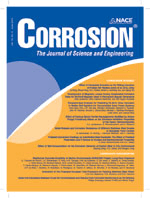
CORROSION
Scope & Guideline
Advancing the Science of Corrosion Management
Introduction
Aims and Scopes
- Corrosion Mechanisms and Processes:
A core focus of the journal is to elucidate the fundamental mechanisms underlying corrosion phenomena, including electrochemical reactions, environmental influences, and material responses. This includes studies on localized corrosion types such as pitting, crevice, and stress corrosion cracking. - Corrosion Mitigation Strategies:
The journal emphasizes research on various corrosion protection methods, including the development and evaluation of coatings, inhibitors, and cathodic protection techniques aimed at extending the service life of materials in corrosive environments. - Material-Specific Corrosion Studies:
Research articles often target specific materials, including metals and alloys, providing insights into their corrosion behavior under diverse conditions such as marine, acidic, or high-temperature environments. - Innovative Testing and Characterization Methods:
The journal promotes the use of advanced experimental and computational techniques for corrosion assessment, including electrochemical methods, imaging techniques, and modeling approaches to predict corrosion rates and mechanisms. - Environmental Impact on Corrosion:
The impact of environmental factors such as temperature, humidity, and chemical composition on corrosion processes is a significant area of exploration, with studies assessing how these factors influence the durability of materials.
Trending and Emerging
- Corrosion in Sustainable and Renewable Energy:
Recent publications increasingly address corrosion challenges in the context of renewable energy technologies, such as solar panels and wind turbines, emphasizing the need for materials that can withstand harsh environmental conditions. - Microbiologically Influenced Corrosion (MIC):
There is a growing emphasis on the study of microbiologically influenced corrosion, particularly in oil and gas pipelines, where microbial activity significantly impacts the integrity of materials. - Advanced Materials and Coatings:
Research on innovative materials, including nanomaterials and high-entropy alloys, and their corrosion resistance is gaining traction. This includes studies on the effectiveness of novel protective coatings. - Machine Learning and Computational Modeling:
The application of machine learning and computational modeling techniques for predicting corrosion behavior and optimizing corrosion mitigation strategies is on the rise, indicating a trend towards data-driven approaches in corrosion research. - Corrosion in Extreme Environments:
Emerging studies focus on corrosion in extreme environments, such as deep-sea and high-pressure conditions, reflecting the industry's need for materials that can perform reliably under such challenges.
Declining or Waning
- Traditional Corrosion Testing Methods:
There seems to be a waning focus on conventional corrosion testing methods that do not incorporate modern analytical techniques. As the field advances, researchers are increasingly favoring innovative, high-throughput testing methodologies that provide more comprehensive data. - Corrosion in Non-Metallic Materials:
Studies specifically targeting corrosion in non-metallic materials have decreased, potentially as a shift towards more pressing issues related to metallic corrosion in structural applications has taken precedence. - Localized Corrosion in Simple Environments:
Research focusing on localized corrosion in straightforward, controlled environments is less frequent, indicating a shift towards more complex and realistic conditions that mimic real-world applications.
Similar Journals

Protection of Metals and Physical Chemistry of Surfaces
Connecting Theory and Application in Materials ChemistryProtection of Metals and Physical Chemistry of Surfaces is a prominent academic journal published by MAIK NAUKA/INTERPERIODICA/SPRINGER, which provides a specialized platform for researchers and professionals in the fields of materials chemistry, metals and alloys, organic chemistry, as well as surfaces, coatings, and films. With an ISSN of 2070-2051 and an E-ISSN of 2070-206X, the journal is recognized for its rigorous peer-reviewed content and comprehensive coverage of innovative research addressing the latest advancements in material protection and surface chemistry. As of 2023, the journal has been categorized in the Q3 quartile across several relevant fields, highlighting its increasing influence within the scientific community. Although the journal is relatively niche, its open access model encourages wide dissemination of knowledge, fostering collaboration and advancements within its core disciplines. Research published in this journal plays a crucial role in not only enhancing theoretical understanding but also facilitating practical applications in various industries, thereby underlining its importance for students, researchers, and professionals alike.
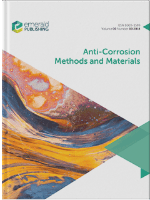
ANTI-CORROSION METHODS AND MATERIALS
Decoding the Science of Corrosion MitigationANTI-CORROSION METHODS AND MATERIALS, published by EMERALD GROUP PUBLISHING LTD, is a leading journal in the fields of chemical engineering and materials science, focusing on innovative methods and materials for corrosion prevention and control. With its ISSN 0003-5599 and E-ISSN 1758-4221, this esteemed journal has been contributing to the academic community since its inception in 1954 and continues to be relevant through 2024. Despite its Q3 ranking in both Chemical Engineering and Materials Science categories, the journal plays a critical role in disseminating valuable insights and advancements, catering to a diverse audience of researchers, professionals, and students. Although the journal does not offer open access options, it remains a significant resource for those seeking to enhance their understanding of corrosion methodologies and to implement best practices in various industrial applications. With the recent Scopus rankings reflecting its impact, ANTI-CORROSION METHODS AND MATERIALS stands as a pivotal element of scholarly discourse in mitigating corrosion challenges in modern materials.

Moroccan Journal of Chemistry
Bridging Local Insights with Global Chemistry Research.Moroccan Journal of Chemistry, published by the University Mohammed Premier Oujda, serves as a pivotal platform for researchers and professionals in the field of chemistry, particularly focusing on diverse and emerging areas within the discipline. Established in 2018, this open-access journal facilitates widespread dissemination of scholarly articles, ensuring that cutting-edge research reaches a global audience. With an ISSN of 2351-812X and categorized in the Q3 quartile for miscellaneous chemistry in 2023, the journal maintains rigorous peer-review standards while fostering an inclusive environment for scientific dialogue. Located in Morocco, it aims to bridge local and international research communities, contributing to the advancement of knowledge in chemistry. As it continues to grow, the Moroccan Journal of Chemistry remains an essential resource for students, educators, and professionals eager to stay abreast of the latest developments in the field.
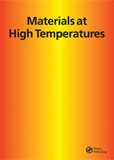
MATERIALS AT HIGH TEMPERATURES
Exploring the Frontiers of High-Temperature MaterialsMATERIALS AT HIGH TEMPERATURES is an esteemed peer-reviewed journal published by Taylor & Francis Ltd, focusing on the intricate and dynamic field of materials science. With an ISSN of 0960-3409 and an E-ISSN of 1878-6413, this journal provides a platform for researchers to disseminate findings related to high-temperature materials, ranging from metals and alloys to ceramics and composites. The journal has established itself as a vital resource within the academic community, reflected in its categorization in the third quartile for various fields such as Ceramics and Composites, Mechanical Engineering, and Materials Chemistry according to the 2023 metrics. Its impact is underscored by Scopus rankings, positioning it among other notable journals in materials science and engineering. Although it does not offer Open Access, MATERIALS AT HIGH TEMPERATURES remains an invaluable source for ongoing research and development, with converged years spanning from 1991 to 2024, it continues to address cutting-edge challenges in high-temperature applications, thereby holding significance for researchers, professionals, and students striving for advancements in this critical area of study.
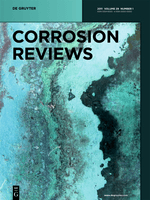
CORROSION REVIEWS
Navigating the Complexities of Corrosion Across DisciplinesCORROSION REVIEWS, published by WALTER DE GRUYTER GMBH in Germany, is a pivotal journal dedicated to advancing the understanding and management of corrosion phenomena across various fields including Chemical Engineering, Chemistry, and Materials Science. With an ISSN of 0334-6005 and an E-ISSN of 2191-0316, this esteemed journal has demonstrated an enduring commitment to scholarly excellence since its inception in 1979, encompassing comprehensive interdisciplinary research outputs and reviews. Ranked in the Q2 category across several disciplines for 2023, and positioned favorably in Scopus rankings—#94 in Chemical Engineering and #145 in Chemistry—it serves as an essential resource for researchers and professionals seeking to enhance their knowledge and application of corrosion science. While the journal does not currently offer open access, its rigorous peer-review process ensures high-quality, credible research publications that contribute significantly to the academic community's efforts in corrosion prevention and policy. Researchers, students, and industry professionals alike will find CORROSION REVIEWS an indispensable tool for staying at the forefront of this critical area of study.

Corrosion Science and Technology-Korea
Advancing corrosion knowledge for a sustainable future.Corrosion Science and Technology-Korea, published by the CORROSION SCIENCE SOC KOREA, is a pivotal journal dedicated to the exploration and advancement of knowledge in corrosion science, particularly within the context of materials performance and maintenance. Established to foster innovation and collaboration among scholars in South Korea and beyond, this journal focuses on areas such as electrochemistry, metal alloys, and surface coatings, catering to a diverse audience of researchers, professionals, and students in materials science and chemistry. Despite its current quartile rankings, including Q4 in Electrochemistry and Q3 in various materials-related categories, the journal aims to enhance its visibility and impact in the scientific community by publishing high-quality research and reviews. With its ISSN 1598-6462 and E-ISSN 2288-6524, Corrosion Science and Technology-Korea is committed to contributing to the understanding and mitigation of corrosion issues, thereby promoting sustainability and longevity in engineering applications.
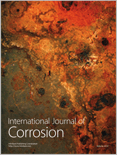
International Journal of Corrosion
Transforming Materials Science Through Corrosion ResearchInternational Journal of Corrosion is a distinguished peer-reviewed journal published by HINDAWI LTD, focusing on the critical field of corrosion research, a vital aspect of materials science and chemical engineering. Since becoming an Open Access journal in 2010, it has provided a platform for disseminating pivotal findings related to corrosion mechanisms, prevention strategies, and innovative materials designed to counteract corrosion, thus directly impacting industries ranging from construction to energy. The journal boasts a respectable impact reflected in its Scopus rankings, holding a Q3 quartile in both Materials Science and Process Chemistry and Technology, with commendable rankings of #157 out of 463 and #37 out of 73, respectively. By fostering knowledge exchange and collaboration among researchers, professionals, and students, the International Journal of Corrosion plays an essential role in advancing the understanding of corrosion phenomena, thereby contributing significantly to the development of more resilient materials and sustainable engineering practices.

International Journal of Electrochemical Science
Exploring the electrochemical landscape of tomorrow.International Journal of Electrochemical Science is a peer-reviewed journal dedicated to disseminating cutting-edge research in the field of electrochemistry. Published by Elsevier in Serbia, this journal serves as a vital platform for scientists and researchers to explore innovative electrochemical techniques, processes, and applications. With an ISSN of 1452-3981, it has been a respected source of scholarly articles since its inception in 2006 and continues to bridge the gap between theoretical advancements and practical implementations up until 2024. Notably, it holds a Q4 quartile ranking in the field of electrochemistry and ranks 41 out of 60 in the Scopus database, situating it within the 32nd percentile among its peers. The journal champions open academic discourse, contributing significantly to the advancement of knowledge in electrochemical sciences, making it an essential resource for researchers, professionals, and students alike who are striving towards new discoveries and innovations.

RARE METAL MATERIALS AND ENGINEERING
Elevating Standards in Materials Science and EngineeringRARE METAL MATERIALS AND ENGINEERING is a vital academic journal dedicated to advancing the fields of materials science, engineering, and metallurgy. Published by the NORTHWEST INST NONFERROUS METAL RESEARCH in China, this journal has been an essential resource for researchers and professionals since its inception in 1993. With a focus on rare metals and their engineering applications, the journal addresses contemporary issues and innovations in materials chemistry and electronic engineering, providing insights into the properties and uses of advanced materials. Although it currently falls within the Q4 category for several categories, including Electrical and Electronic Engineering and Materials Chemistry, its commitment to quality and relevance in the field is evident. The journal offers a platform for researchers to share their findings with the scientific community, fostering collaboration and knowledge exchange in an important area of study. Researchers and students interested in exploring the latest in rare metal technologies and engineering methodologies will find this journal a valuable addition to their academic library.

Obrabotka Metallov-Metal Working and Material Science
Empowering Discoveries in Mechanical EngineeringObrabotka Metallov-Metal Working and Material Science is a pivotal journal published by Novosibirsk State Technical University, focusing on the dynamic fields of mechanical engineering, mechanics of materials, and the science of metals and alloys. With ISSN 1994-6309 and E-ISSN 2541-819X, the journal serves as a crucial platform for disseminating research from Russia and around the globe. Currently classified in the Q4 category for Mechanical Engineering and Mechanics of Materials, as well as Q3 for Metals and Alloys, it encompasses a wide range of studies from fundamental research to innovative applications. Despite its relatively recent inception in 2019, the journal has established itself with Scopus rankings that highlight its growing influence—Rank #122 out of 176 in Materials Science and Rank #510 out of 672 in Engineering. This journal aims to foster collaboration among researchers, professionals, and students by featuring original articles, reviews, and technical notes that address contemporary challenges in metal processing and material science. As it continues to evolve through 2024, Obrabotka Metallov remains dedicated to enhancing the understanding and application of materials science, making it a significant resource for those invested in the future of engineering and technology.